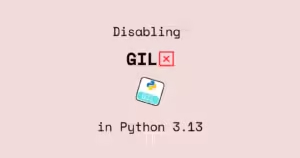Python 3.13 introduces several significant updates, from enhanced performance to new features and deprecations, aimed at improving developer experience and code performance.
Table of Contents

Key Changes in Python 3.13
Experimental JIT Compiler
- What: The introduction of a preliminary Just-In-Time (JIT) compiler aimed at enhancing execution speed for computationally intensive tasks.
- Impact: This feature is designed to significantly speed up Python code execution, especially in loops and repeated function calls, potentially making Python more competitive with languages like C and Java for performance-intensive applications.
- Status: To activate it, you can compile Python with the
--enable-experimental-jitflag.
GIL (Global Interpreter Lock) Improvements
- What: Enhancements to the GIL, aiming to reduce its impact on multithreaded applications. The updates are geared towards allowing better thread management and concurrency.
- Impact: This change is particularly beneficial for I/O-bound tasks. While still a work in progress, these optimizations set the stage for potential future versions of Python that could support a more flexible concurrency model
- Status: Being experimental, this feature is not enabled by default and may require specific flags or usage patterns to activate
Improved REPL
- What: The Read-Eval-Print Loop (REPL) has been upgraded with features like multiline editing, colourized prompts, and keyboard shortcuts.
- Impact: These improvements provide a more user-friendly interactive coding experience, making it easier to experiment and debug code in real-time
Updated pathlib Behavior
- What: The globbing behaviour in the pathlib module has been updated so that the ** wildcard now matches both files and directories by default.
- Impact: This aligns the module’s functionality with Unix shell behaviour, making file operations more intuitive for developers
Enhanced Error Messages
- What: Improvements to error messages to provide clearer guidance on issues like module name conflicts and invalid keyword arguments.
- Impact: These changes reduce debugging time and make it easier for developers to identify and fix issues in their code
Memory Optimization for Docstrings
- What: Leading indentation in docstrings is now stripped automatically.
- Impact: This reduces memory usage and .pyc file sizes, which can be significant for larger projects
Typing System Extensions
- What: New features in the typing system include typing.TypeIs for type narrowing and annotations for read-only fields in TypedDicts.
- Impact: These enhancements improve type checking and code clarity, making it easier to write and maintain complex code
Removals and Deprecations
- Python 3.13 removes several outdated modules as part of PEP 594, including cgi, telnetlib, and aifc.
- Additionally, lib2to3, a tool that supported code migration from Python 2 to Python 3, is no longer available.
- Other notable removals include tkinter.tix, typing.io, and typing.re.
Platform and Compatibility Updates
- Support for macOS versions below 10.13 has been discontinued, while WASI (WebAssembly System Interface) is now officially supported at Tier 2.
- iOS and Android gain Tier 3 support, broadening Python’s usability across platforms.
These changes, along with updates to the release cycle extending full support to two years, reinforce Python’s commitment to performance, consistency, and usability.
Activating the JIT Compiler
- Python 3.13 introduces an experimental Just-in-Time (JIT) compiler, although it remains disabled by default.
- This JIT utilizes a copy-and-patch compilation approach, where binary code templates are patched and optimized for faster execution.
- Designed to complement the existing Specializing Adaptive Interpreter (from Python 3.11), the JIT further boosts Python’s performance on platforms where enabled.
- However, because the feature is still experimental, it is primarily intended for testing and not yet recommended for production.
To activate it, you can compile Python with the --enable-experimental-jit flag.Experimental GIL-Free Versions
If you have access to the experimental feature, run the script with the command line flag to disable the GIL, for instance:
python -X no-gil your_script.pyConclusion
Python 3.13 represents a significant stride forward, particularly in terms of performance and usability. With experimental features like the JIT compiler and GIL optimizations, this version lays the groundwork for improved concurrency and execution speed, addressing long-standing limitations in multithreading. Updates to the typing system and REPL make coding more intuitive, while deprecations streamline Python’s standard library to better serve modern development needs.
Python 3.13 not only brings immediate advantages for developers but also signals a future where Python may continue evolving in ways that enhance scalability and maintain its versatility. With each release, Python stays relevant and powerful, ensuring it remains a go-to choice for developers across industries.